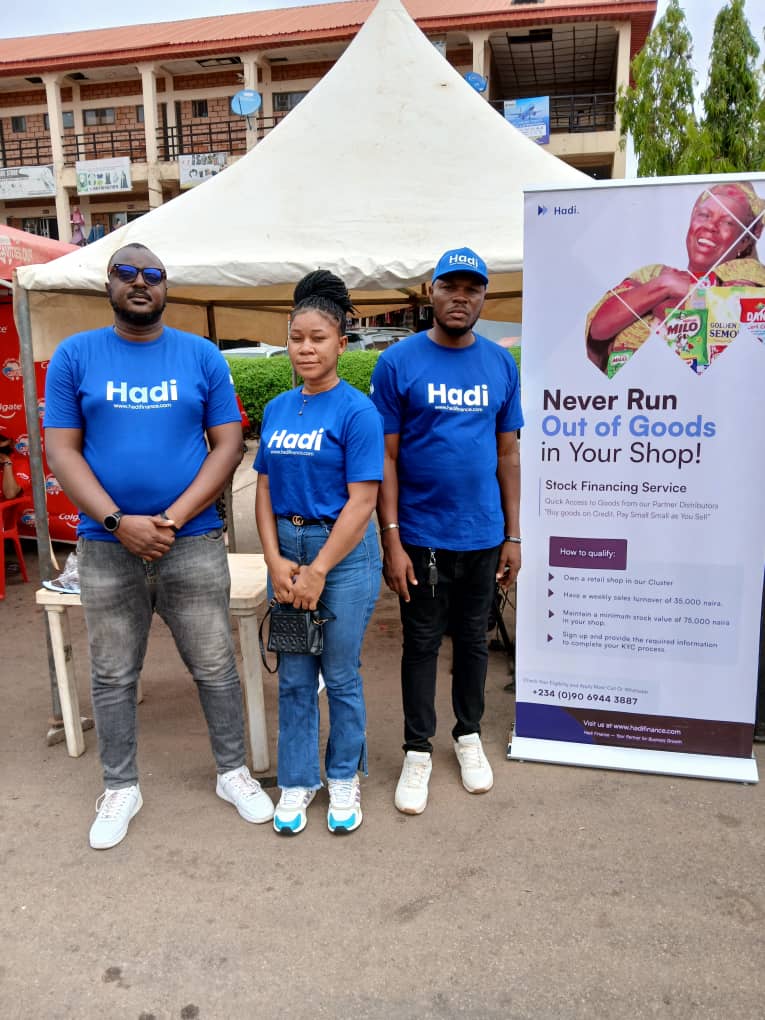Nigeria’s informal economy accounts for an estimated 58% of its GDP; however, businesses within the informal sector face challenges when it comes to accessing credit.
Hadi Finance began with a simple goal: to be a bank for Nigeria’s informal small businesses. But its co-founder, Bidemi Adebayo, quickly learned that in a market where the word “loan” is synonymous with shame and destruction of livelihood, she wasn’t just selling credit. She was fighting a deep-seated stigma.
Day 1: The pivot from products to capital
Hadi Finance did not start as a lending company. Launched in 2022, its first incarnation was as a retail distributor. They operated a warehouse in Abuja, serving over a thousand customers and moving over $100,000 monthly in stock.
Their theory was that a hub-based model bringing warehouses closer to markets would win. They were wrong. The brutal lesson came from the market’s extreme price sensitivity. “You are selling for like ₦3,000 and another guy is bringing it for ₦2,950,” Adebayo explains. Retailers would choose to take a cab to a cheaper supplier rather than accept the convenience of delivery for a higher price. “Nothing prepares you for it,” she says.
Those first few months revealed the real problem wasn’t access to goods but access to cash flow. “We discovered that the main issue among retailers is how to access goods and credit to keep turning over as fast as possible.” They had stumbled from selling products to solving for capital, setting them on a new, far more complex path.

Day 500: Battling distrust with the ‘human touch’
The pivot to lending thrust Hadi Finance into what Adebayo calls the “nightmare” of building a startup in Nigeria. The core challenge was no longer logistics, but trust. “There is a stigma to [being] a loan company in the market,” she says. Borrowers feared embarrassment, being locked up, or having their families called. “They feel that you’re a loan shark, they feel that ‘if I collect this money, it can destroy my business’”
This deep-seated distrust meant Hadi Finance couldn’t rely on technology alone. The solution was the “human touch”. Their very first customer was Adebayo’s own mother, a retailer, who became their announcer among her network of fellow retailers.
They reframed their approach into what Adebayo calls “a catalyst for growth.” This wasn’t just a marketing slogan; it dictated their entire operating model. “We want to have a human touch in all our processes. When a customer applies for a loan, field agents are dispatched within 12 hours. We are visiting your business, we’re looking at what’s the right financing for you.” This high-touch approach builds familiarity, a key ingredient for trust.
This philosophy extends to when things go wrong. Unlike traditional lenders, their first response to a default isn’t intimidation. “We have our support agents visiting you and saying, ‘What is going on?’” Adebayo says. If a retailer is struggling to sell a commodity, Hadi’s team will try to help them find a better-priced supplier. “We are not here to cause chaos in your business.” This human-centered approach allows more businesses to trust them.
Hadi Finance promises a 48-hour disbursement timeline for loan requests. To achieve this, the team built a frugal, speed-focused verification system that balances security with the retailer’s need for urgency. Field agents are assigned in clusters, and when a business within a specific cluster requests a loan, the field agents are dispatched to the business to verify its authenticity.
This approach, giving fast loans and supporting SMEs after lending, has meant that many of Hadi Finance’s new customers are referrals.
Day 1000+: The human path
Now approaching a new chapter, the company’s identity is firmly rooted in its community-centric approach, an advantage born from Adebayo’s own background. “My mom is a retailer,” she shares. This background allows her to relate to the struggles of their prospective customers, as ground zero is in her own home.
Their definition of success – trusted finance – is now clear. “For every capital that goes out, we need to see the money to come back,” Adebayo states. “For every small business we empower, we need to see like 2x, 3x the growth.”
Hadi Finance is expanding into new products, such as invoice financing, asset financing for items like freezers, and business tools, all designed to gather more data and serve their customers better.
For Hadi Finance, the first 1,000 days taught them that in a market where trust is the scarcest resource, the most powerful technology isn’t just code; it is empathy, presence, and the relentless commitment to being a partner in growth, not just a source of funds.


